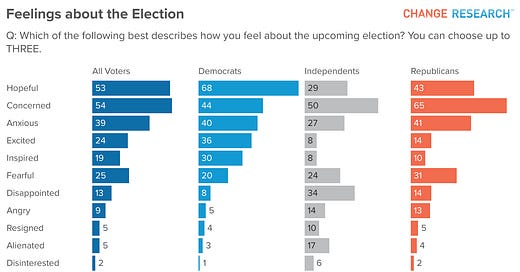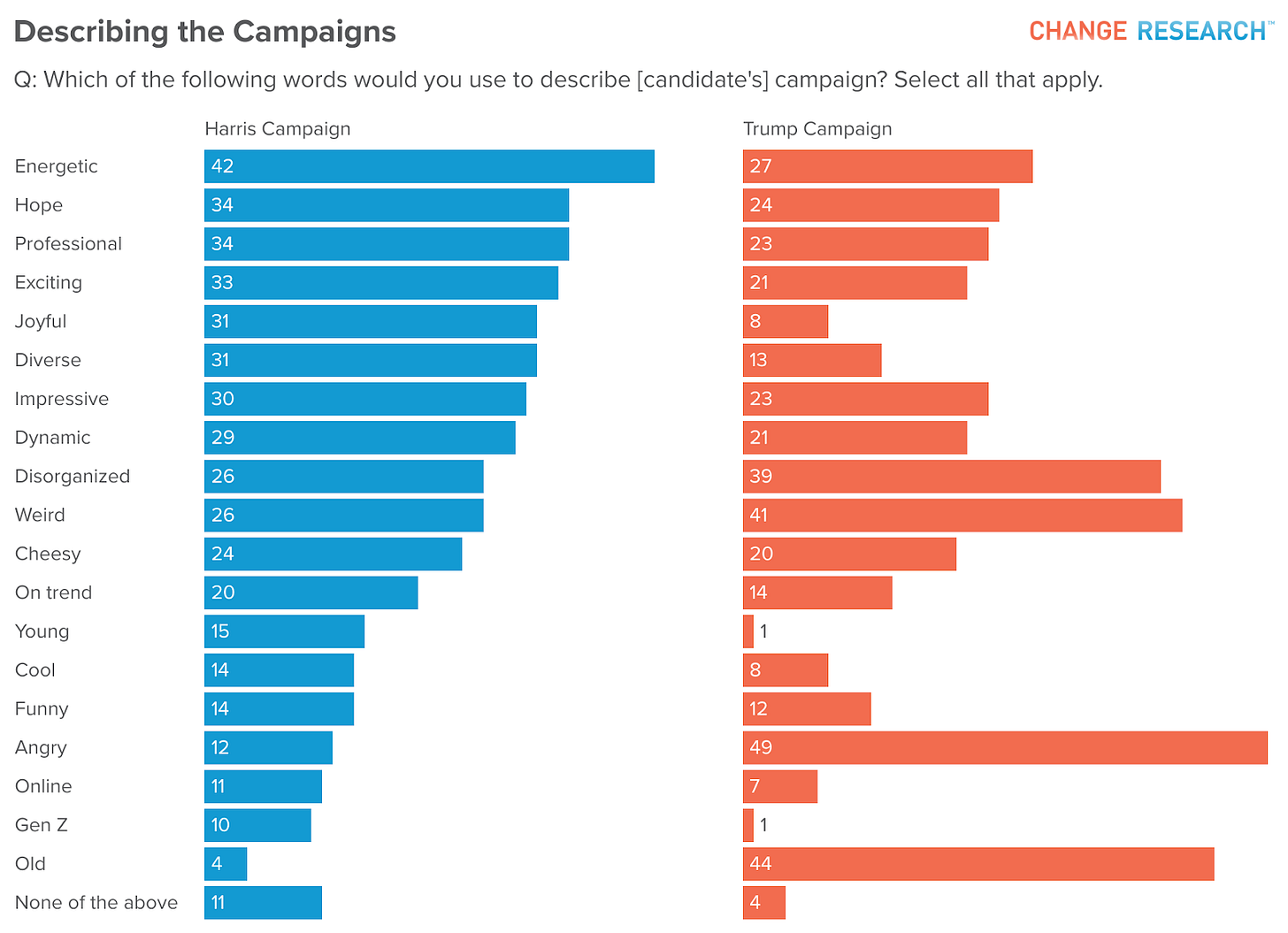Last week, Democrats convened for the DNC in Chicago. The energy at the convention was palpable, but let’s see how the race is feeling to voters. Change Research has fresh data, collected during and immediately after the convention, on the current state of the race (Aug 20-26, 2024).
When thinking about the upcoming election, Democrats are most commonly feeling hopeful, while Republicans are feeling concerned. This doesn’t mean all of the Democrats’ worries have been alleviated. A significant portion also feel concerned and anxious, but the change in feelings about the race is undeniable.
Beyond the base, is there any evidence of a honeymoon? Has there been any surge in the polls? Kamala Harris currently has a 5-point lead over Donald Trump. This can be compared to July 22-24 when the two candidates were tied. This gain did not happen overnight and wasn’t entirely because of the DNC. FiveThirtyEight's national aggregation has shown a steady increase in support for Harris over the past month. Before the convention, the Harris-Trump gap was more like +2.5-3% for Harris. This poll shows a continuation of that trend.
Beyond vote intention, Kamala Harris’ favorability has continued to rise. Her “very favorables” have doubled since June, while her “very unfavorables” have declined by 4-pts. Given the suddenness of Tim Walz’s elevation to a national figure, there isn’t much data on him yet, but impressions are net-positive (44% favorable, 7% neutral, 41% unfavorable, and 9% haven’t heard of him).
Voters most commonly describe Kamala Harris as a “typical Democrat” and “energetic,” followed by “intelligent” and “charismatic.” Since early July, there has been an increase in the perceived applicability of all of the positive attributes tested. Impressions show that voters view her as a leader who “can bring the nation together,” is a “strong leader on the world stage,” “energetic,” and “powerful and strong”. There has also been a significant decrease in belief that Harris would “divide the nation even more,” and that she is “wishy-washy” or “weird”.
While Republicans have tried to frame Kamala Harris as belonging to the extreme left wing of the Democratic Party, voters don’t see her that way. Voters are most likely to believe she is similar to Tim Walz, Barack Obama, and Joe Biden. They are far less likely to situate her alongside Alexandria Ocasio-Cortez or Bernier Sanders. She’s also unlikely to be placed alongside those who lean further right in the party - fewer than half of voters believe she is the same as Bill Clinton.
Voters have vastly different impressions of the Harris and Trump campaigns. Harris’ campaign is most commonly perceived as energetic and hopeful followed by professional, exciting, joyful, and diverse. Conversely, Trump’s campaign is most commonly described as angry, old, weird, and disorganized.
The next big event (pending Trump dropping out) of the campaign is the presidential debate on September 10th. Most voters are eager to watch - 80% say they are “certain” or “likely” to do so. Voters are also enthusiastic about watching J.D. Vance and Tim Walz debate - 74% are certain or likely to tune in. Democrats and Republicans have high hopes for their respective candidates - 97% of Democrats think Harris will win, and 95% expect Walz to beat J.D. Vance. Conversely, 95% of Republicans think Trump will come out ahead and 93% have the same expectation for Vance.
Methodology: n=2626 Registered Voters were surveyed online from Aug 20-27, 2024. Respondents were surveyed using a mixture of Dynamic Online Sampling and text-to-web. The modeled margin of error is +/-2.1%. Please refer to the full methodology statement and toplines.
Product Manager, Kyla brings ten years of qualitative and quantitative research experience to Change Research. She has designed action-oriented studies for a wide range of clients, including government, unions, pension funds, and green energy. As a committed lifelong learner, she recently completed her Masters of Science in Analytics from the University of Chicago and also holds Bachelors and Masters degrees from Carleton University in Ottawa, Canada.










